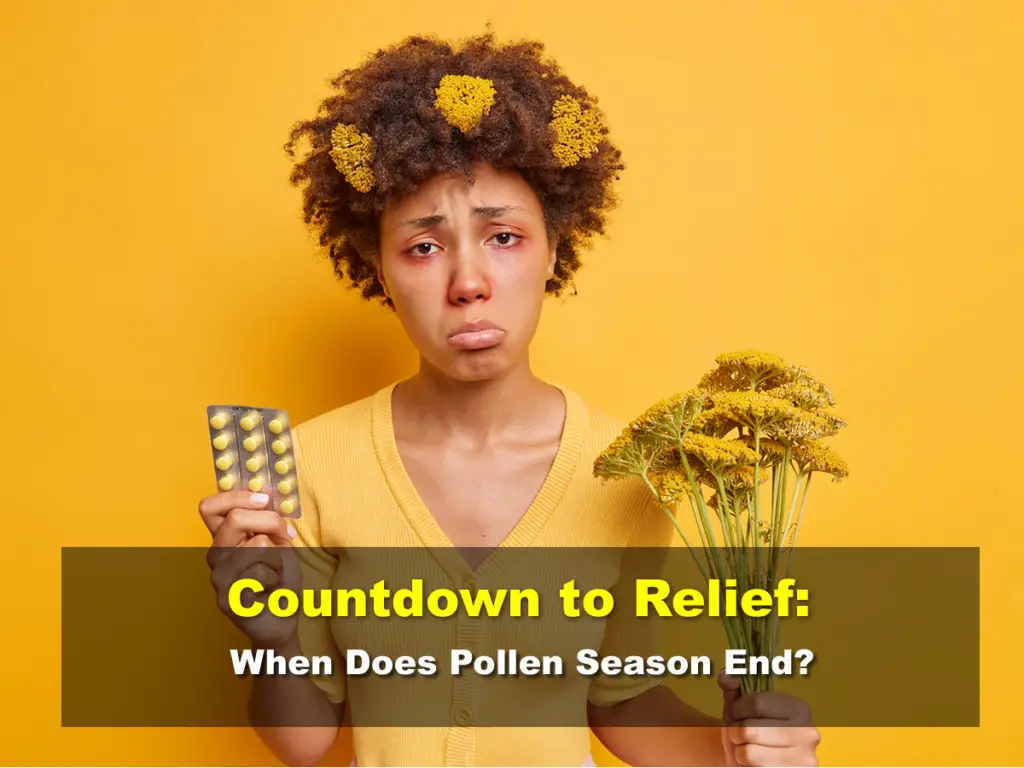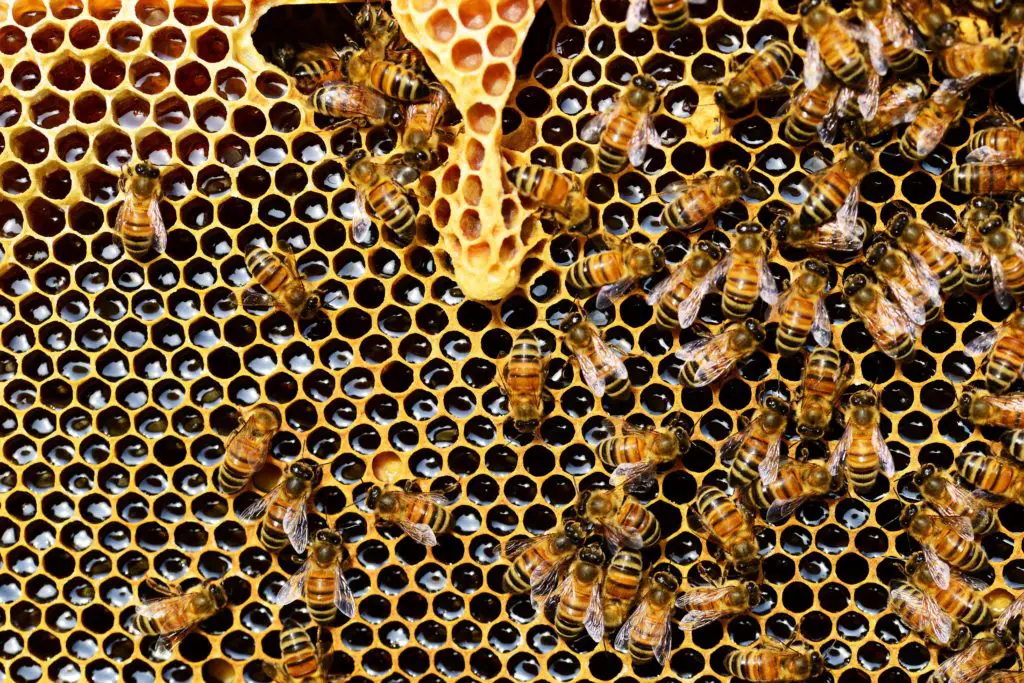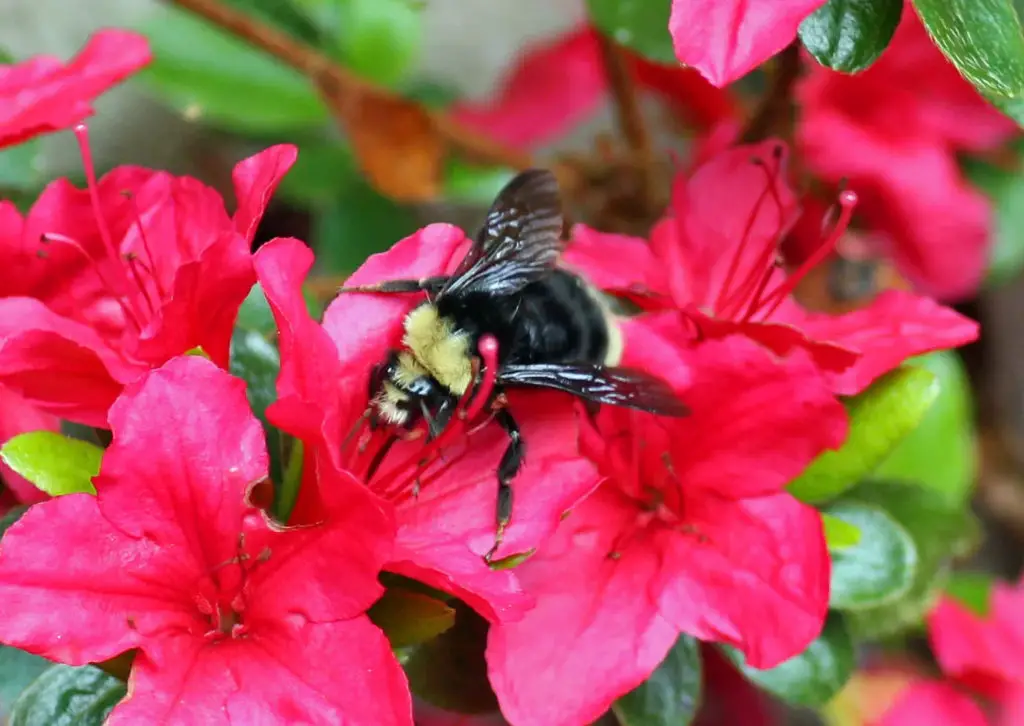Affiliate Disclaimer - As an Amazon Associate I earn from qualifying purchases.
It supports the website. So, Thank you
I suffer from seasonal allergies and there is nothing worse than finding yourself itching and sneezing in the middle of pollen season. It can totally ruin an afternoon outdoors with friends and family yet the CDC reports that as many as a quarter of all Americans suffer from some sort of seasonal allergies.
If you’re one of this unfortunate 27% then you’re probably wondering when the misery will end, so, when does pollen season end?
There are three main pollen seasons; tree, grass, and weed pollen seasons. Each of these seasons overlaps and runs from as early as February through until October.
While living through pollen season can be very unpleasant, there are some things you can do to alleviate your symptoms and I’ll talk more about that, and other pollen-related topics in this guide.
Table of Contents
When Are The Different Pollen Seasons?
Different types of plants produce pollen at different times of the year. Pollen is a substance that plants use to encourage fruit and seed production which then enables them to reproduce. Pollen can be transported between flowers via several methods including insects, wind, and water.
Tree Pollen Season
Tree pollen season is the first to rear its ugly head and can begin as early as February. This is the season that tends to affect me the most and I usually find myself waking in the night with an itchy throat and runny nose. That’ll teach me to sleep with the window open!
Many allergy sufferers have symptoms during tree pollen season but if this is something you have a problem with then there is some good news. Tree pollen season typically ends around May and if this is the only type of pollen that affects you, you’ll start to see your symptoms peter out.
Grass Pollen Season
At the beginning of April, grasses start to produce pollen and there are millions of people who are affected by this.
For the most sensitive sufferers, even the very act of walking across grass or sitting on it can result in very unpleasant symptoms. For others, mowing the lawn can set things off so this is best avoided where possible.
Grass pollen season usually ends around June and it’s during this time that allergy sufferers can relax a little.
Take A Break
From June to August, most plants have stopped producing pollen so you can breathe a sigh of relief.
Of course, there are some parts of the world where the timing of pollen season is slightly different according to factors like the local climate. However, you can check your local pollen count online and this is something I’d highly recommend as it will allow you to better prepare for and manage your symptoms.
Weed Pollen Season
Even though there’s a short hiatus in the middle of pollen season, things aren’t quite over for the year just yet.
In August and right through until October, weeds begin to produce and release pollen. I found out the hard way recently that I also have an allergy to weed pollen (albeit not as severe as my tree pollen allergy) when I was pulling (flowering) weeds in the garden and began itching and sniffling. At least it’s an excuse to avoid those pesky garden jobs, I suppose!
What Are The Symptoms Of A Pollen Allergy?
The way that pollen affects people can vary from person to person. I am asthmatic so in very severe pollen counts, I also have issues with my asthma flaring up which brings on a whole other set of symptoms Of course, proper medication management for secondary conditions that are exacerbated is incredibly important.
While you may not experience exactly the same symptoms as the next person, the most common include:
- Skin rashes and itching
- Wheezing, coughing, and difficulty breathing
- An itchy throat
- Sneezing and/or a runny/blocked nose
- Headaches
- Watery or itching and irritated eyes
- Postnasal drip (mucus running down the back of the throat)
- Feeling more tired than usual (this is usually associated with a lack of sleep due to the disturbance caused by other symptoms.)
Why Is Pollen Irritating To Humans?
Pollen is a naturally occurring substance that isn’t actually harmful to humans. In fact, you can even eat it and most people won’t have any reaction. Although, being a pollen allergy sufferer, I recall a time that I placed a piece of cut lemon into my water, and minutes later my throat had swollen and I struggled to breathe.
That’s because there was tree pollen left on the lemon and I had foolishly not bothered to wash it first.
So, what is it that causes our bodies to react in such a violent manner? It’s all to do with your immune system. When you have an allergy and pollen enters your body, your immune system mistakes it for a threat.
This then triggers the release of a chemical known as histamine which is your body’s natural defense against a supposed threat. The side effects of this histamine release are the symptoms you experience such as itchy skin and irritation.
What’s more, your body tries to rid itself of the pollen through coughing, sneezing, and watery eyes. So, while these symptoms may be annoying, they’re actually essential in getting the pollen out of your body.
Can Pollen Allergy Symptoms Be Managed?
I speak from experience when I say that pollen allergy symptoms are incredibly frustrating. For some people, they can become so bad that there is no other option to remain inside. But since pollen season largely takes place over summer, this is devastating as you cannot go out and enjoy the nice weather.
But there is some good news; there are ways you can manage your pollen allergy symptoms both medicinally and therapeutically.
Medicines
One of the most common methods of controlling allergy symptoms is to take over-the-counter medications known as antihistamines. These drugs are designed to counteract your body’s response to the pollen and reduce your symptoms.
I personally take this type of medication and have gotten into the habit of beginning the drugs just before the start of tree pollen season.
The thing to remember about antihistamines is that they work better when you allow the medication to build up (and remain) in your system. While a single tablet (or a spoonful of liquid antihistamine) would lessen your symptoms to a degree, it isn’t a permanent solution.
It’s important to start taking your medication as a preventative measure and continue taking the recommended daily dose until pollen season comes to a close.
In some cases, people may have such a severe allergic reaction that the over-the-counter medications aren’t enough to quell their symptoms. But doctors are able to prescribe much stronger drugs that usually bring some much-needed relief.
I should also mention that antihistamines (as with every drug) do come with some side effects. These are usually minor but you should speak with your doctor or pharmacist if you experience any side effects as they may be able to help you find a more suitable medication.
There are two main types of antihistamines, each containing a different active ingredient. These ingredients may be loratadine or cetirizine and both can bring on different side effects. So, if you find that one type causes you problems, it may be that the other type is more suitable.
The following are some of the side effects you may expect:
- Drowsiness
- Dry mouth
- Dry eyes or blurred vision
- Increased heart rate
- Low blood pressure
- Feeling faint or dizzy
- Problems with peeing or pooping
Finally, if all else fails in terms of allergy medication, you may consider undergoing a course of treatment via allergy shots. This is known as immunotherapy and can be very effective. However, it’s worth noting that it won’t yield immediate results.
Immunotherapy involves having a series of shots that contain small amounts of the allergen. This allows your body to gradually get used to it and will eventually desensitize you.
Usually, people who have this treatment start to notice a significant reduction in their symptoms by the second year. By the third year, symptoms are usually entirely gone.
Other Ways To Control Pollen Allergy Symptoms
While most people find that medication works well for them, it isn’t something that is suitable for everyone. But that doesn’t mean that you have to put up with those pesky allergy symptoms. In fact, there are lots of natural things you can do to relieve your symptoms and enjoy the summer.
- Wear wraparound sunglasses to prevent pollen from getting into your eyes.
- If you have to do garden work, such as mowing or weeding, be sure to wear a mask or respirator to avoid breathing pollen in.
- After spending time outdoors, take a shower and wash your clothing to remove any pollen spores.
- Avoid sitting on grass if you have a grass pollen allergy. If you’re going for a picnic, consider taking a blanket or something else you can sit on to avoid direct contact.
- Keep windows and doors closed in the house. This can be annoying as good airflow keeps things cool indoors but a good air conditioning system or stand-alone fans can be a great alternative.
- Check the pollen count every day as this will allow you to be better prepared.
Final Thoughts
Pollen allergies can make your life incredibly miserable and the symptoms are highly unpleasant. But if you suffer from a pollen allergy, you’re not alone because around a quarter of all people have problems with this condition.
I’ll bet you’ve asked yourself amid a fit of sneezes ‘When does pollen season end?’; just wanting that bit of relief.
Pollen season lasts from around February and continues until October with a short respite between June and August. It’s important to remember that different types of plants release pollen at different times within these dates so getting to know which ones affect you most will better help you manage your symptoms.




